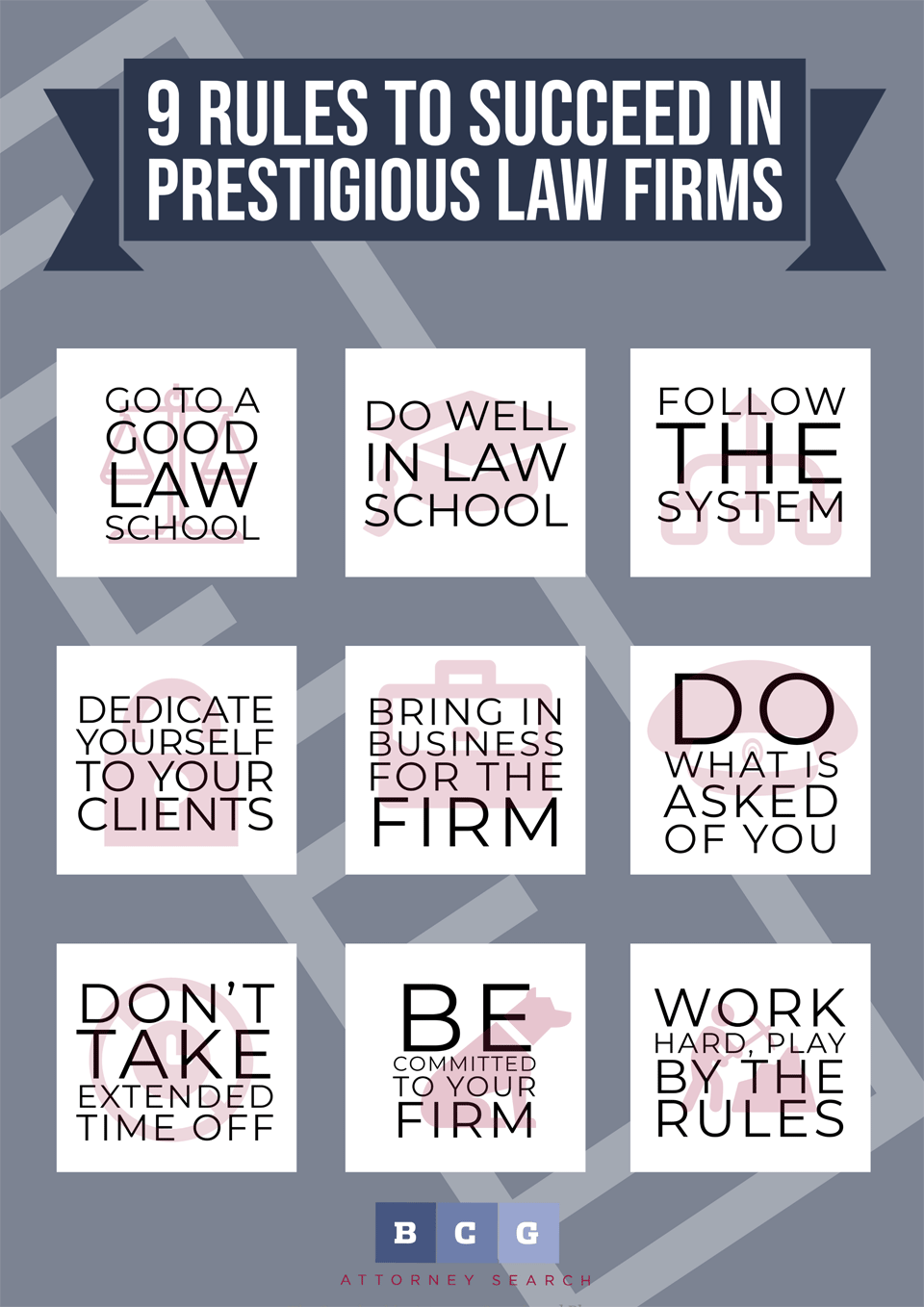- Part of succeeding or failing within a law firm is knowing how others in that same law firm have succeeded or failed.
- Look into this article for insight into how you can succeed within a large law firm, and not fail like so many have before you.
Summary: If you want to succeed in a large law firm, you need to understand what is causing so many other attorneys to fail. Learn more in this article.

I started my early career as an asphalt contractor. Like practicing law, there is a great deal of money that can be made in asphalt contracting if you are very good at it. Like practicing law, people advance and succeed in the asphalt contracting business for a variety of reasons.

|
|
|
NOTE: At the outset, I want to warn you that much of what you are about to read may be offensive to you personally. It may upset you because I am going to lay out some cold, very hard truths about practicing law and succeeding at it—and it is not going to be what you want to hear. I am going to tell you why you may not deserve the success you have and how to hold on to it. I am also going to tell you why if you have a great opportunity you need to take advantage of it and give it everything the opportunity asks of you.
The most successful asphalt contractor I knew was making so much money that when he built a new house on top of a large hill he installed hydraulics on the home so he could move it in various directions to face the sun as it rose and fell each day. He was a huge success story. He was not educated, not incredibly motivated and not particularly “flashy” or obvious. He did one thing very well, however: He followed rules.

He had gotten very wealthy under a government program that benefited minority contractors and people from special backgrounds. I am not going to tell you if he was handicapped, an American Indian, black, or something else—it does not matter. What is important here is that he was given a special opportunity because of something in his background that made the government want to advance him in an industry that had traditionally been dominated by white, middle class men. (Women contractors were also considered a “special group” under this program.) Many lawyers respond to firm challenges with rationalizations rather than adaptation. The Most Common Excuses That Attorneys Give for Failing in Their Careers explores how these thought patterns compound systemic issues. Systemic failures can compound personal mistakes. Watch our video on 15 career mistakes attorneys make to learn how to navigate these hurdles effectively.
As part of this program, the contractor had to
- document all of his workers,
- adhere to certain bonding requirements (he needed to have money set aside in case stuff went wrong),
- do work of a certain quality,
- have breaks at a certain time,
- pay his workers a certain way and a certain amount,
- have diversity in his workforce,
- maintain his equipment a certain way,
- use materials that met certain standards,
- allow the government to audit his books, and,
- follow numerous other rules that most contractors do not have to follow.
Since the government was hiring him to build roads and do other things that were important for the public, the government had certain standards it wanted followed. Prior to getting this opportunity, the contractor had worked almost exclusively on parking lots and homes – areas where there is not a major need for having such systems. By the grace of God, he was suddenly able to compete in the “big leagues” and start working on federal and state highways – where millions of dollars flow.
He did these things, worked hard and succeeded beyond his wildest expectations. He understood that success came from following the systems and that you succeed to the degree you follow the systems.
He told me that when he won his first contract, one of the most successful people he knew said to him:
“You better not take this for granted and you better do everything they ask of you. Do not mess this up. Sometimes you only get one chance.”
In truth, this contractor got very, very lucky: He was not the most qualified to do the jobs and had less experience than other contractors. Notwithstanding, the program stepped in and helped him and he understood that this was a “lucky break” and he took the opportunity he was given and did everything in his power to make it work for him. It did.
He soon became one of the largest asphalt contractors around and invested in his business, grew it and became more successful.
The least successful contractor I knew was also part of this program. He also got a large state job that was awarded to him under this program.
- The first thing he did when he got a large job was he went out and bought an expensive car.
- He liked to pay people in cash and started to believe all of the rules, procedures and so forth under the state program did not apply to him.
- He did not maintain his equipment properly.
- He let his insurance lapse and never maintained his books in the way he was supposed to.
- Because he did not play by the rules, the state stopped him in the middle of one of his projects and did not pay him.
- He started bouncing checks and could not pay people, or pay for his equipment. His expensive car was repossessed.
- The last time I worked with him, he did not even have a bank account and was doing all of his deals in cash.
The contractor who failed had a sense of entitlement. He felt the rules and systems did not apply to him. He was owed “special status” and deserved the jobs he got. Instead of viewing the special advantage he had been given as a “blessing,” he blew it. Not following the rules cost him a successful business and the opportunity for major growth. It was as simple as that. The last time I spoke with him he was talking about hiding one of his dump trucks because he was worried the truck’s tires he had bought on credit were going to be repossessed.
In truth, the contractor who failed was more confident, a harder worker, a better salesman, had more “charisma” and was a better marketer than the one who succeeded. His failure was as simple as that he did not follow the systems and believed the rules did not apply to him.
You should never think the rules do not apply to you. In the world of major law firms, the rules are the same for everyone.
One of the oddest things out there is the phenomenon of attorneys who believe that rules do not apply to them. I have been doing a lot of thinking about top law school graduates (Yale, Stanford, Chicago) recently because I keep seeing them fail and it should not be that way.
Like contractors who incorrectly believe they do not need to follow the rules, many top law school graduates do not reach anywhere near the levels of accomplishment they have the potential to reach in their careers. They typically come out of law school and may clerk, or do a position inside of a law firm for a year or two and then go do something else entirely – something not involving a law firm. Then after a few years of doing this they may decide they want to go back to a law firm.
“Maybe they will allow me to come back as a partner,” they tell me.
“Why would they do that … because you went to a top law school?” I ask.
Guess what happens?
They do not get a warm reception—for even associate positions.
Law firms know they are likely to leave, will probably not follow the system and believe they are “above” being attorneys in a law firm. They may not work as hard, or will make unreasonable demands for advancement due to where they attended law school.
Because they have such a difficult time staying at the top of the law firm pecking order after a series of poor career decisions, many of these attorneys then find “safety” teaching in law schools, or sometimes working in government. There is nothing wrong with this, of course, and many people that come out of law school go and do these things. The issue, though, is that many of these attorneys show tremendous potential but end up in these environments (law schools, government positions) where there is limited advancement potential because they are not following the rules. This concept is further expanded in the video Why Your Family and Social Background Will Determine Your Happiness and Success as an Attorney, which examines how early life circumstances influence a lawyer’s ability to navigate firm systems.
The secret of being enormously successful at anything lies in understanding the rules that govern whatever it is you are trying to accomplish. To be successful in an “established” game you generally need to follow the systems and cannot outrun them.
- Just because you got a job through connections does not mean you are exempt from the systems.
- Just because you got a job because you were first in your law school class does not mean you are exempt from the systems.
- Just because you got lucky getting a job does not mean you are exempt from the systems.
- Just because you may have been hired and advanced due to your affiliation with a special interest group does not mean you are exempt from the system.
- Just because you got a job because you interview extremely well and have a ton of charisma does not mean you are exempt from the system.
Regardless of how special you may believe you are due to your background, you will never succeed in a law firm environment without playing by the rules. Anyone looking at your resume for more than three seconds inside of a major law firm can tell if you are following the system and playing by the rules.
- Quit your job without a new one lined up? REJECTED. Not following the rules and systems.
- Went in-house? REJECTED. Not following the rules and systems.
- Switched practice areas? REJECTED. Not following the rules and systems.
- Left the practice of law to try something else for a few years? REJECTED. Not following the rules and systems.
- Keep moving law firms every year or two? REJECTED. Not following the rules and systems.
- Became a contract attorney and now want to return to a large law firm? REJECTED. Not following the rules and systems.
- Became a solo practitioner and want to return to a large law firm? REJECTED. Not following the rules and systems.
- Moved to a small town to be near latest love interest, took a job in a small town, broke up and now want to return to a major market. REJECTED. Not following the rules and systems.
- “I don’t want to follow the system!”
- “I hate the lifestyle of large law firms!”
- “I look at the lives of partners and I want to be nothing like them!”
- “No one is going to tell me what to do—my family and independence are important to me.”
No matter how you spin it, this is just how it works.
Most business people would much rather own a McDonald’s, Starbucks, TGI Fridays or other sort of chain restaurant than start their own hamburger restaurant, coffee shop or family restaurant. Most attorneys would rather work in a prestigious law firm making a massive salary than go to work in an unknown law firm.
- Anyone can start a hamburger restaurant. The barrier to entry is not that great at all. You might be able to do it for $20,000 (or less) and you will suddenly be in control of your destiny, will not need to follow orders and can do things how you want to! The odds are, though, that you will fail. Even if you do not fail the odds are you will not make much money at all. Most restaurants fail.
- Anyone can go to law school and pass the bar somewhere. After that, anyone can start their own law firm, or get a position with an unknown law firm making very little money. The odds are that the attorney will fail, or not do nearly as well as if the attorney had joined a serious law firm and followed the systems. Anyone can quit his or her job in a good-sized firm and decide to do something else on his or her own, or do something completely different. While there are certainly exceptions, most people who do this fail and do not make much money at all. How many attorneys do you know who have left large law firms and never been as successful ever again?
To start a McDonald’s you need to pay a franchise fee of $1-million dollars and follow a rigid system dictated by the company for how you operate the business—McDonald’s has a 12-binder manual of procedures for everything it does. You need to be trained in the system in order to own a McDonald’s and you are going to constantly have your McDonald’s inspected, tested and more to make sure you are following the system. They will not sell a McDonald’s to anyone who wants one, either. They will interview you, probe your commitment and do everything they can to make sure that you are going to be the best fit for them. It is all about being the sort of person who will commit and follow the rules and systems.
If you do not follow their system you will lose your $1-million dollars and McDonald’s will take your restaurant over and never allow you to buy a franchise from them ever again. If you fail with a McDonald’s, or any other franchise, then most franchises will want nothing to do with you ever again. They believe you failed because you did not follow their systems. The same goes for just about every franchise out there that is worth owning. Franchises have systems, expectations and clear ways of doing things – and they work. Very few McDonald’s fail and most people who own them make a lot of money doing so.
You cannot own a McDonald’s, or other franchise, if you think that the rules do not apply to you. Can you imagine going to a McDonald’s where people did not wear uniforms, where they used different ingredients and menu items, where the style of the restaurant was unrecognizable from what a McDonald’s should look like and where people did not follow the other systems that make a McDonald’s a McDonald’s? It would be crazy and it would not happen.
Can you imagine going into a major law firm where attorneys worked the hours they wanted, where attorneys came and went as they pleased, where attorneys only worked on what they wanted to, where people were paid well with no expectations, where things got done for major clients when the attorneys wanted to do them? It would be crazy and it would not happen.
There is a price to being an attorney in a prestigious and large law firm and staying an employee in a large law firm:
- You generally need to have gone to a good law school and done very well. You need to have shown commitment early on to get into a good law school.
- If you did not go to a good law school, you need to have done very well at the school you did go to.
- You need to be willing to work hard and play by their rules.
- You need to dedicate yourself to your practice area and the clients of the law firm.
- As you get more senior, you need to start bringing in business for the firm, or showing promise to do so.
- You need to do what is asked of you, follow the system and not quit or move around for inconsequential reasons.
- You need to not have any gaps on your resume—and you need to be committed to working in a law firm.
- The second law firms believe you are not committed to working in a law firm they will stop hiring you and will let you go.
You need to follow and understand the system that you are a part of. If you do not follow the system you will be in trouble and will not do well. There is a system for how things work in prestigious law firms and these systems are all basically the same at all good law firms. The procedures, rules and systems are all inescapable. The biggest mistake an attorney can make is to fail to understand and follow these rules and systems. If you do not understand and follow these rules and systems the odds are you will be in for a very rough ride in your career. The systems and procedures exist because they work and everyone is responsible for following them.
That is why I get so depressed when I see people who have so much potential falling off the map because they do not follow the systems. I speak with these people each week and it is depressing.
On Friday I spoke with someone who somehow got a position in a top-tier law firm as a corporate attorney despite going to a fourth-tier law school and not having done particularly well there. This person also went to a lousy college. But she was a former professional model and beauty queen and she obviously had charisma and could sell herself well.
After a year of practicing law, she decided she was going to get married and pick up and move to an idyllic rural location and practice law there. She moved there for six months without a job and did not work for a while. She then broke up with her fiancé and moved back to a major US city and expected a warm reception from law firms. She became extremely angry with me when I told her that her odds of getting a position inside of a major law were slim to none. I asked her the following questions:
“How did you get a job in such a good firm coming out of the middle of your class from a fourth-tier law school?” She knew someone.
“What would law firms think about her potential stability and commitment to working in a major law firm after having quit to move to a resort destination?” She had experience with a major law firm—why shouldn’t they be interested in her?
“How committed was she to practicing law?” She wanted to practice for a year or two and maybe go in-house.
“Would she leave if something more interesting came along again—a man, a new job and so forth?” Yes, she might, “but I do not need to tell law firms that.”
None of these things make this woman employable, despite charisma and whatever else is going on. No one in his or her right mind is going to hire someone who is not likely to work out and is not committed to the system. Why would they? There is no reason or motivation for law firms to bring people in who are not going to follow the system and give every indication from the start that they are not going to work out.
Doors open for a lot of people to prestigious law firms and they stay open to the degree attorneys follow the system.
- Doors may open because of your ethnic or religious background. You may be hired because you are a minority—or because you are exactly like the other attorneys there in terms of your race, religion and so forth.
- Doors may open because of where you went to law school, or how you did there. Going to a good law school is a positive thing (as is doing well).
- Doors may be open because you interview well, have a ton of charisma, are good looking or have other things law firms like. These are all good as well and can open doors.
- Doors may open because you know someone. Connections mean something and can get you into a major law firm.
- Doors may open because you are in a very in demand practice area and they need someone immediately and cannot find people. Just because a practice area is in demand right now does not mean that it will stay in demand—but it is enough to open doors sometimes.
People become successful in prestigious law firms—and life in general—to the degree they follow systems. The systems exist because when people follow the systems the group and individuals in them do better because they follow them. If you do not follow the systems and rules your career will generally get derailed. It happens quite quickly—and it happens to most attorneys. Just one bad decision and it could be all over.
- If someone who opens a McDonald’s suddenly stops following the system that person will lose his or her McDonald’s.
- If you stop following the system, you will lose your right to practice in a large, prestigious law firm.
It goes to the firms and people with systems. McDonald’s, Amazon, Starbucks – all the brands and companies that succeed and become household names are those that create, follow and have systems.
If a door opens for you, walk through and commit to the rules and system of where you are no matter what. Attorneys succeed and fail to the degree they are willing to follow and commit to the system. Understanding the 17 key reasons law firms choose not to hire or make offers adds context to why these elite environments are so competitive.
Click here to contact Harrison
About Harrison Barnes
No legal recruiter in the United States has placed more attorneys at top law firms across every practice area than Harrison Barnes. His unmatched expertise, industry connections, and proven placement strategies have made him the most influential legal career advisor for attorneys seeking success in Big Law, elite boutiques, mid-sized firms, small firms, firms in the largest and smallest markets, and in over 350 separate practice areas.
A Reach Unlike Any Other Legal Recruiter
Most legal recruiters focus only on placing attorneys in large markets or specific practice areas, but Harrison places attorneys at all levels, in all practice areas, and in all locations-from the most prestigious firms in New York, Los Angeles, and Washington, D.C., to small and mid-sized firms in rural markets. Every week, he successfully places attorneys not only in high-demand practice areas like corporate and litigation but also in niche and less commonly recruited areas such as:
- Immigration Law
- Workers Compensation
- Insurance
- Family Law
- Trust and Estate
- Municipal law
- And many more...
This breadth of placements is unheard of in the legal recruiting industry and is a testament to his extraordinary ability to connect attorneys with the right firms, regardless of market size or practice area.
Proven Success at All Levels
With over 25 years of experience, Harrison has successfully placed attorneys at over 1,000 law firms, including:
- Top Am Law 100 firms such including Sullivan and Cromwell, and almost every AmLaw 100 and AmLaw 200 law firm.
- Elite boutique firms with specialized practices
- Mid-sized firms looking to expand their practice areas
- Growing firms in small and rural markets
He has also placed hundreds of law firm partners and has worked on firm and practice area mergers, helping law firms strategically grow their teams.
Unmatched Commitment to Attorney Success - The Story of BCG Attorney Search
Harrison Barnes is not just the most effective legal recruiter in the country, he is also the founder of BCG Attorney Search, a recruiting powerhouse that has helped thousands of attorneys transform their careers. His vision for BCG goes beyond just job placement; it is built on a mission to provide attorneys with opportunities they would never have access to otherwise. Unlike traditional recruiting firms, BCG Attorney Search operates as a career partner, not just a placement service. The firm's unparalleled resources, including a team of over 150 employees, enable it to offer customized job searches, direct outreach to firms, and market intelligence that no other legal recruiting service provides. Attorneys working with Harrison and BCG gain access to hidden opportunities, real-time insights on firm hiring trends, and guidance from a team that truly understands the legal market. You can read more about how BCG Attorney Search revolutionizes legal recruiting here: The Story of BCG Attorney Search and What We Do for You.
The Most Trusted Career Advisor for Attorneys
Harrison's legal career insights are the most widely followed in the profession.
- His articles on BCG Search alone are read by over 150,000 attorneys per month, making his guidance the most sought-after in the legal field. Read his latest insights here.
- He has conducted hundreds of hours of career development webinars, available here: Harrison Barnes Webinar Replays.
- His placement success is unmatched-see examples here: Harrison Barnes' Attorney Placements.
- He has created numerous comprehensive career development courses, including BigLaw Breakthrough, designed to help attorneys land positions at elite law firms.
Submit Your Resume to Work with Harrison Barnes
If you are serious about advancing your legal career and want access to the most sought-after law firm opportunities, Harrison Barnes is the most powerful recruiter to have on your side.
Submit your resume today to start working with him: Submit Resume Here
With an unmatched track record of success, a vast team of over 150 dedicated employees, and a reach into every market and practice area, Harrison Barnes is the recruiter who makes career transformations happen and has the talent and resources behind him to make this happen.
A Relentless Commitment to Attorney Success
Unlike most recruiters who work with only a narrow subset of attorneys, Harrison Barnes works with lawyers at all stages of their careers, from junior associates to senior partners, in every practice area imaginable. His placements are not limited to only those with "elite" credentials-he has helped thousands of attorneys, including those who thought it was impossible to move firms, find their next great opportunity.
Harrison's work is backed by a team of over 150 professionals who work around the clock to uncover hidden job opportunities at law firms across the country. His team:
- Finds and creates job openings that aren't publicly listed, giving attorneys access to exclusive opportunities.
- Works closely with candidates to ensure their resumes and applications stand out.
- Provides ongoing guidance and career coaching to help attorneys navigate interviews, negotiations, and transitions successfully.
This level of dedicated support is unmatched in the legal recruiting industry.
A Legal Recruiter Who Changes Lives
Harrison believes that every attorney-no matter their background, law school, or previous experience-has the potential to find success in the right law firm environment. Many attorneys come to him feeling stuck in their careers, underpaid, or unsure of their next steps. Through his unique ability to identify the right opportunities, he helps attorneys transform their careers in ways they never thought possible.
He has worked with:
- Attorneys making below-market salaries who went on to double or triple their earnings at new firms.
- Senior attorneys who believed they were "too experienced" to make a move and found better roles with firms eager for their expertise.
- Attorneys in small or remote markets who assumed they had no options-only to be placed at strong firms they never knew existed.
- Partners looking for a better platform or more autonomy who successfully transitioned to firms where they could grow their practice.
For attorneys who think their options are limited, Harrison Barnes has proven time and time again that opportunities exist-often in places they never expected.
Submit Your Resume Today - Start Your Career Transformation
If you want to explore new career opportunities, Harrison Barnes and BCG Attorney Search are your best resources. Whether you are looking for a BigLaw position, a boutique firm, or a move to a better work environment, Harrison's expertise will help you take control of your future.
Submit Your Resume Here to get started with Harrison Barnes today.
Harrison's reach, experience, and proven results make him the best legal recruiter in the industry. Don't settle for an average recruiter-work with the one who has changed the careers of thousands of attorneys and can do the same for you.
About BCG Attorney Search
BCG Attorney Search matches attorneys and law firms with unparalleled expertise and drive, while achieving results. Known globally for its success in locating and placing attorneys in law firms of all sizes, BCG Attorney Search has placed thousands of attorneys in law firms in thousands of different law firms around the country. Unlike other legal placement firms, BCG Attorney Search brings massive resources of over 150 employees to its placement efforts locating positions and opportunities its competitors simply cannot. Every legal recruiter at BCG Attorney Search is a former successful attorney who attended a top law school, worked in top law firms and brought massive drive and commitment to their work. BCG Attorney Search legal recruiters take your legal career seriously and understand attorneys. For more information, please visit www.BCGSearch.com.
Harrison Barnes does a weekly free webinar with live Q&A for attorneys and law students each Wednesday at 10:00 am PST. You can attend anonymously and ask questions about your career, this article, or any other legal career-related topics. You can sign up for the weekly webinar here: Register on Zoom
Harrison also does a weekly free webinar with live Q&A for law firms, companies, and others who hire attorneys each Wednesday at 10:00 am PST. You can sign up for the weekly webinar here: Register on Zoom
You can browse a list of past webinars here: Webinar Replays
You can also listen to Harrison Barnes Podcasts here: Attorney Career Advice Podcasts
You can also read Harrison Barnes' articles and books here: Harrison's Perspectives
Harrison Barnes is the legal profession's mentor and may be the only person in your legal career who will tell you why you are not reaching your full potential and what you really need to do to grow as an attorney--regardless of how much it hurts. If you prefer truth to stagnation, growth to comfort, and actionable ideas instead of fluffy concepts, you and Harrison will get along just fine. If, however, you want to stay where you are, talk about your past successes, and feel comfortable, Harrison is not for you.
Truly great mentors are like parents, doctors, therapists, spiritual figures, and others because in order to help you they need to expose you to pain and expose your weaknesses. But suppose you act on the advice and pain created by a mentor. In that case, you will become better: a better attorney, better employees, a better boss, know where you are going, and appreciate where you have been--you will hopefully also become a happier and better person. As you learn from Harrison, he hopes he will become your mentor.
To read more career and life advice articles visit Harrison's personal blog.






